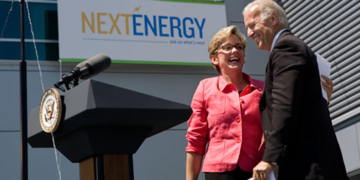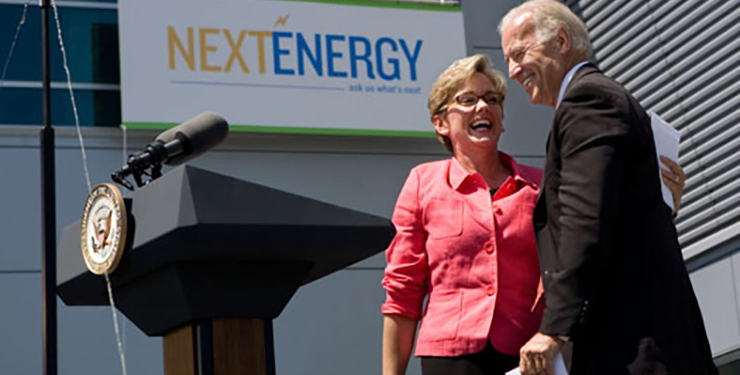A new study published by two green organizations stands at odds with the stated reasoning behind one of President Joe Biden’s most aggressive moves against the fossil fuel industry.
Ceres, a green consultancy, and an environmental group called Clean Air Task Force (CATF) recently released a study using Environmental Protection Agency (EPA) data that found methane emissions from natural gas activity decreased while production increased between 2015 and 2022. The Biden administration paused approvals for new liquified natural gas (LNG) export terminals in January in large part because of its “evolving understanding” of “the perilous impacts of methane” and concerns that continuing as normal could inflict major damage on the climate.
Notably, both Ceres and CATF support major government action to decarbonize the American economy, a goal that Biden has also pursued through his first term as president. Ceres is a leading force in the environmental, social and corporate governance (ESG) investing push, while CATF aims to “accelerate the development and deployment of zero-carbon fuels” and also to “catalyze deep, global reductions in methane emissions.”
Specifically, the study found that, between 2015 and 2022, U.S. natural gas production increased by 40% while methane emissions from that production fell by 37%, according to the study. The study and its results indicate that “when energy companies want to, they can effectively reduce emissions of methane,” according to Canary Media, an independent nonprofit news outlet launched by the Rocky Mountain Institute that focuses on green energy and climate change.
Could Joe Biden’s Natural Gas Pause Cost Dems The Senate In November?https://t.co/57P0eAOGYJ
— Daily Caller (@DailyCaller) February 29, 2024
“The fact is that the major portion of greenhouse gas emissions in the western world for the last three decades has come about thanks to natural gas — made up mainly of the constantly demonized methane — displacing coal in power generation. All of the central planning efforts by the activists and their water carriers in the public policy realm pale in comparison,” David Blackmon, a 40-year veteran of the oil and gas business who now writes and consults on the energy industry, told the Daily Caller News Foundation. “I’d like to send a personal word of thanks to Ceres and CATF for conducting this revealing study, even if they are reluctant to talk about its key results.”
The study’s authors used data from the EPA’s Greenhouse Gas Reporting Program (GHGRP) and calculations based on the agency’s Greenhouse Gas Inventory to inform their findings, as opposed to a direct measure of emissions. The study concedes that GHGRP data is not perfect because it can be prone to underestimating emissions, but the program “currently represents the most robust and comprehensive inventory of company-level [greenhouse gas] emissions from the oil and gas industry.”
Notably, both Ceres and CATF support major government action to decarbonize the American economy, a goal that Biden has also pursued through his first term as president.
“From 2015 to 2022, U.S. natural gas production increased by 40 percent, while methane emissions from gas extraction declined by 37 percent,” Steve Everley, a senior managing director for FTI Consulting’s energy and natural resources practice, wrote in a post to X about the Ceres and CATF study. “Remember that the central justification for the LNG export pause was alleged uncertainty about the climate advantage of U.S. natural gas, with methane emissions being a key element.”
Biden’s Climate Czar Dodges When Asked Point Blank How Blocking Natural Gas Projects Will Lower Emissions https://t.co/lg2EFhowrS
— Daily Caller (@DailyCaller) January 29, 2024
One of the reasons for the decrease in emissions is technological advancement, which has allowed operators to more accurately monitor possible methane leaks, for example, according to ARUSI, an engineering firm based in Phoenix, Arizona.
Concerns about methane pollution and climate change factored into the administration’s decision to halt new LNG export terminal approvals in January, according to the White House. Numerous environmental groups have applauded the decision, with some specifically citing methane emissions as a key concern addressed by the decision.
However, Biden’s pause is unlikely to bring down global emissions because would-be buyers of natural gas will likely look to other countries who produce gas less cleanly to meet their needs, energy sector experts previously explained to the DCNF.
Two previous Department of Energy (DOE) analyses — conducted in 2014 and 2019, respectively — have found that American LNG exports are cleaner than coal that is mined and used domestically. While the Biden administration apparently is not swayed by those studies, White House officials were reportedly “influenced” by a questionable paper authored by an expressly anti-fossil fuel Ivy League professor that arrived at the exact opposite conclusion.
Robert Howarth of Cornell University, the paper’s author, released it into the public domain before passing through peer review specifically so that it could impact political discussions about gas exports, and the paper’s topline finding has been revised several times since its initial release. Howarth has battled against the fossil fuel industry for years while openly favoring a societal shift away from their use, and an anti-fracking environmental group partially funded the study.
Critics of the administration’s LNG pause have asserted that the decision was political rather than scientific, viewing the move as one meant to appease the younger, climate-focused voters and well-funded environmental organizations that Biden figures to lean on as he seeks a second term in November.
The White House, Ceres and CATF did not respond immediately to requests for comment.
Featured image credit: Official White House Photo by David Lienemann.
All content created by the Daily Caller News Foundation, an independent and nonpartisan newswire service, is available without charge to any legitimate news publisher that can provide a large audience. All republished articles must include our logo, our reporter’s byline and their DCNF affiliation. For any questions about our guidelines or partnering with us, please contact [email protected].



























 Continue with Google
Continue with Google